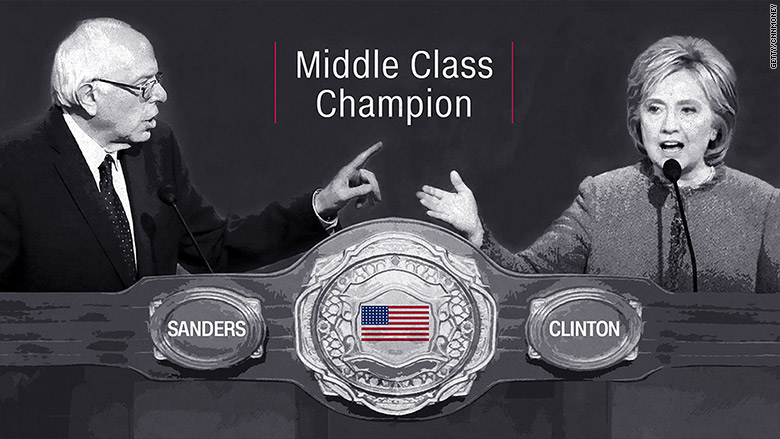
The protector of the middle class ... it's a title both Hillary Clinton and Bernie Sanders want to claim.
Defending working and middle class families are central to both candidates' campaigns, though Sanders has been even more outspoken in his pledge to combat income inequality.
The rivals have similar proposals: Both want to raise the minimum wage, reduce the cost of college and burden of student loans, guarantee paid family leave and invest in infrastructure to create good-paying jobs. And both want the wealthy and large corporations to pay for it ... at least most of it.
The battle between the Democratic presidential candidates heated up this week, with Clinton challenging Sanders to prove that his expansive wish list -- which includes Medicare for all, free college tuition, paid family leave and other programs -- wouldn't raise the tax levy on the middle class. In particular, the Clinton campaign wants Sanders to detail how he'd pay for his health plan, arguing that a similar proposal he had introduced in Congress in 2013 would have raised taxes on the middle class by 9%.
Clinton further upped the ante, repeating her promise not to increase taxes on middle class to pay for her programs. Her income threshold for that group $200,000 for single taxpayers and $250,000 for couples.
"We need to give middle class families a break, not a tax increase. The last thing we should be doing is raising taxes on the middle class," Jake Sullivan, a senior policy advisor on the Clinton campaign, said Wednesday.
Sanders responded by issuing a press release detailing how he'd pay for his proposals "to rebuild the middle class." He did not include health insurance on the list, but reminded Clinton that she once supported his ideas.
The skirmish over middle class taxes began last fall, when Clinton first drew contrasts between Sanders' tax proposal and her own. The main issue: the Vermont senator's provision to increase weekly payroll taxes by $1.61 for the typical worker to pay for 12 weeks of family and medical leave.
When Clinton pledged not to raise taxes on families making less than $200,000 in last month's Democratic debate, Sanders retorted that paid family leave is a worthy investment.
"She is disagreeing with FDR on Social Security, LBJ on Medicare and with the vast majority of progressive Democrats in the House and the Senate, who today are fighting to end the disgrace of the United States being the only major country on Earth that doesn't provide paid family and medical leave," he said.


